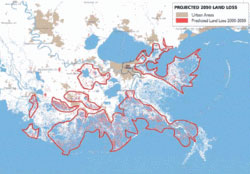Update June 9, 2014: Governor Jindal signed legislation which quashes this lawsuit, calling it "frivolous." It "further improves Louisiana’s legal environment by reducing unnecessary claims that burden businesses so that we can bring even more jobs to our state."
The legislation prevents government bodies in Louisiana from pursuing such litigation – despite warnings from the state attorney general and nearly 100 legal experts. The law is so broad, it could imperil any future lawsuit against oil and gas companies, including current civil litigation against BP for the 2010 Gulf oil spill.
Lawyers for the flood protection board are considering suing the state over the law.
—-
It’s hard for a state like Louisiana to take its main industry to task, but after Hurricane Katrina, having half a shoreline doesn’t cut it anymore.
After Katrina, the state reconstituted its Flood board so that it would consist of scientists and engineers, not politicians. They were charged with figuring out how to restore the vast network of wetlands that used to protect New Orleans from storms.
The board made a courageous decision – take the oil industry to court for "racing to extract the region’s resources" by "a mercilessly efficient, continuously expanding system of ecological destruction."
They are suing all 97 oil and gas companies that operate in the state for dredging 10,000 miles of canals, destroying the wetlands. By redesigning the region for their own use – to haul equipment and install pipelines – they allowed salt water to seep in and oil to leak, which killed the vegetation and flooded the natural barriers – and crucial species habitat – that kept the gulf at bay. Hundreds of thousands of acres of wetlands are gone, leaving New Orleans completely vulnerable to the next big storm.
An acre of land disappears into the ocean every 47 minutes.
"The money and liability that these oil companies have: It’s laid out in black and white what they did, when they did it; there are aerial photographs of it," says Gladstone Jones, attorney for Southeast Louisiana Flood Protection Authority-East.
Red lines show where wetlands used to be:


They aren’t looking for the oil industry to pick up the whole tab for restoration, just their part of it. Dredging has caused about 40% of the damage, according to the US Geological Survey. The rest is due to poor levee design, which has prevented sediment from being deposited from the Mississippi River into the delta, and rising sea levels now add to the flooding.
Estimates are that it will cost $50 billion over 50 years to restore the once-fertile landscape, under Louisiana’s Coastal Master Plan. $1.2 billion will come from a BP spill-related lawsuits, and $140 million a year starts in 2017 under the Gulf of Mexico Energy Security Act. But that’s nowhere near enough to do the job.
The deteriorating coastline impacts all economic activity, from shipping to fisheries, in addition to being a crucial area for millions of migrating birds.
"I think it’s pretty revolutionary that people in Louisiana are talking about the oil and gas damage in a different way," Monique Verdin, a bartender and filmmaker, told the LA Times. "It’s not enviros and hippies. It’s businessmen and others who are saying, ‘This is not right.’"
Will The Lawsuit Be Stopped?
Amazingly, the lawsuit may be stopped. When Governor Jindal heard about it he immediately came to the assistance of the oil industry, saying legislation would be passed to prevent this attack.
And so it went – the two sides of the Republican majority state legislature passed a bill that makes such lawsuits illegal. They also give the governor more control over who sits on the board.
Now it’s waiting for Jindal’s signature. He’s "reviewing" the situation after 22 law professors from universities across the US asked him to veto the bill. Passing it would jeopardize individuals and parishes from receiving compensation from the BP oil spill, now being considered in civil court.
If he doesn’t veto the bill by June 22, it automatically becomes law.
As for the board, they still plan to sue one way or the other. One of the members Jindal ousted has started a nonprofit – Restore Louisiana Now – that’s collecting money for the lawsuit.
"It took nature 6,000 years to create the Louisiana coast, yet only 75 years for humans to destroy one-third of it. Already, 1,900 square miles of coastal lands have melted into the Gulf of Mexico, and that damage has put New Orleans and the entire region on the verge of collapse. The destruction of land is continuing, and if this area washes away, so will the economy and heart of the entire state – and the nation will pay a price as well," says John Barry, President of Restore Louisiana Now.
Read our article, Restoring Wetlands Has Surprising Economic Benefits.
Learn more:
